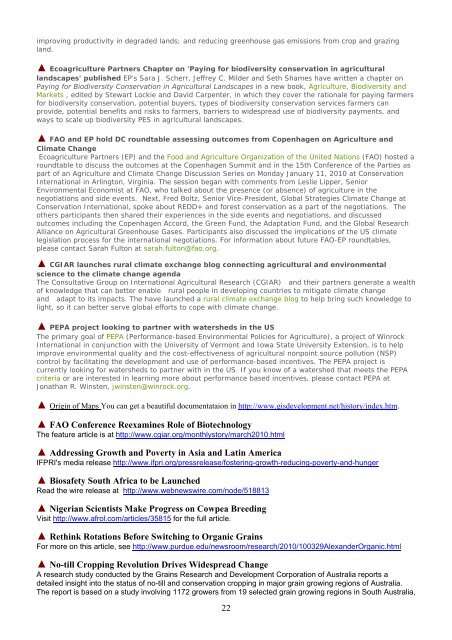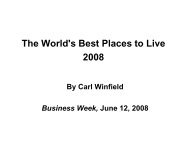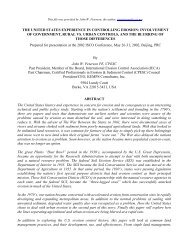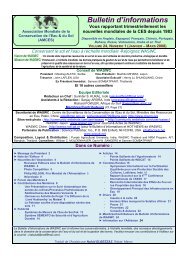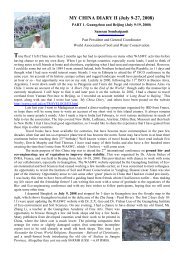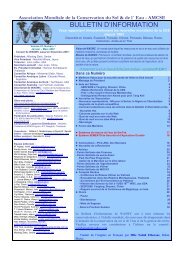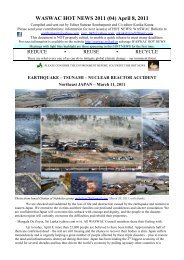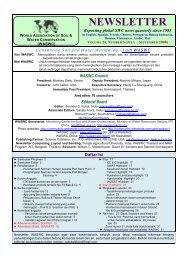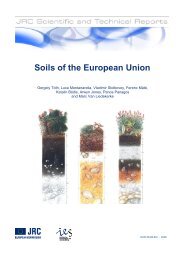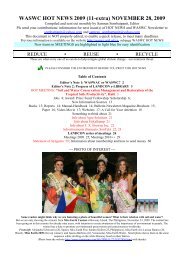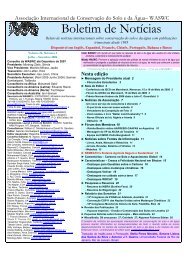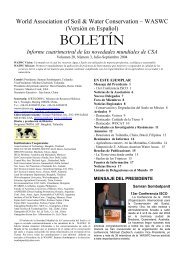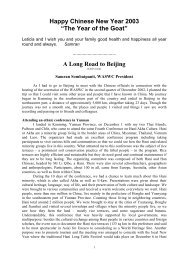April 30, 2010 - World Association of Soil and Water Conservation
April 30, 2010 - World Association of Soil and Water Conservation
April 30, 2010 - World Association of Soil and Water Conservation
Create successful ePaper yourself
Turn your PDF publications into a flip-book with our unique Google optimized e-Paper software.
improving productivity in degraded l<strong>and</strong>s; <strong>and</strong> reducing greenhouse gas emissions from crop <strong>and</strong> grazingl<strong>and</strong>.▲ Ecoagriculture Partners Chapter on 'Paying for biodiversity conservation in agriculturall<strong>and</strong>scapes' published EP’s Sara J. Scherr, Jeffrey C. Milder <strong>and</strong> Seth Shames have written a chapter onPaying for Biodiversity <strong>Conservation</strong> in Agricultural L<strong>and</strong>scapes in a new book, Agriculture, Biodiversity <strong>and</strong>Markets , edited by Stewart Lockie <strong>and</strong> David Carpenter, in which they cover the rationale for paying farmersfor biodiversity conservation, potential buyers, types <strong>of</strong> biodiversity conservation services farmers canprovide, potential benefits <strong>and</strong> risks to farmers, barriers to widespread use <strong>of</strong> biodiversity payments, <strong>and</strong>ways to scale up biodiversity PES in agricultural l<strong>and</strong>scapes.▲ FAO <strong>and</strong> EP hold DC roundtable assessing outcomes from Copenhagen on Agriculture <strong>and</strong>Climate ChangeEcoagriculture Partners (EP) <strong>and</strong> the Food <strong>and</strong> Agriculture Organization <strong>of</strong> the United Nations (FAO) hosted aroundtable to discuss the outcomes at the Copenhagen Summit <strong>and</strong> in the 15th Conference <strong>of</strong> the Parties aspart <strong>of</strong> an Agriculture <strong>and</strong> Climate Change Discussion Series on Monday January 11, <strong>2010</strong> at <strong>Conservation</strong>International in Arlington, Virginia. The session began with comments from Leslie Lipper, SeniorEnvironmental Economist at FAO, who talked about the presence (or absence) <strong>of</strong> agriculture in thenegotiations <strong>and</strong> side events. Next, Fred Boltz, Senior Vice-President, Global Strategies Climate Change at<strong>Conservation</strong> International, spoke about REDD+ <strong>and</strong> forest conservation as a part <strong>of</strong> the negotiations. Theothers participants then shared their experiences in the side events <strong>and</strong> negotiations, <strong>and</strong> discussedoutcomes including the Copenhagen Accord, the Green Fund, the Adaptation Fund, <strong>and</strong> the Global ResearchAlliance on Agricultural Greenhouse Gases. Participants also discussed the implications <strong>of</strong> the US climatelegislation process for the international negotiations. For information about future FAO-EP roundtables,please contact Sarah Fulton at sarah.fulton@fao.org.▲ CGIAR launches rural climate exchange blog connecting agricultural <strong>and</strong> environmentalscience to the climate change agendaThe Consultative Group on International Agricultural Research (CGIAR) <strong>and</strong> their partners generate a wealth<strong>of</strong> knowledge that can better enable rural people in developing countries to mitigate climate change<strong>and</strong> adapt to its impacts. The have launched a rural climate exchange blog to help bring such knowledge tolight, so it can better serve global efforts to cope with climate change.▲ PEPA project looking to partner with watersheds in the USThe primary goal <strong>of</strong> PEPA (Performance-based Environmental Policies for Agriculture), a project <strong>of</strong> WinrockInternational in conjunction with the University <strong>of</strong> Vermont <strong>and</strong> Iowa State University Extension, is to helpimprove environmental quality <strong>and</strong> the cost-effectiveness <strong>of</strong> agricultural nonpoint source pollution (NSP)control by facilitating the development <strong>and</strong> use <strong>of</strong> performance-based incentives. The PEPA project iscurrently looking for watersheds to partner with in the US. If you know <strong>of</strong> a watershed that meets the PEPAcriteria or are interested in learning more about performance based incentives, please contact PEPA atJonathan R. Winsten, jwinsten@winrock.org.▲ Origin <strong>of</strong> Maps You can get a beautiful documentataion in http://www.gisdevelopment.net/history/index.htm.▲ FAO Conference Reexamines Role <strong>of</strong> BiotechnologyThe feature article is at http://www.cgiar.org/monthlystory/march<strong>2010</strong>.html▲ Addressing Growth <strong>and</strong> Poverty in Asia <strong>and</strong> Latin AmericaIFPRI's media release http://www.ifpri.org/pressrelease/fostering-growth-reducing-poverty-<strong>and</strong>-hunger▲ Biosafety South Africa to be LaunchedRead the wire release at http://www.webnewswire.com/node/518813▲ Nigerian Scientists Make Progress on Cowpea BreedingVisit http://www.afrol.com/articles/35815 for the full article.▲ Rethink Rotations Before Switching to Organic GrainsFor more on this article, see http://www.purdue.edu/newsroom/research/<strong>2010</strong>/100329Alex<strong>and</strong>erOrganic.html▲ No-till Cropping Revolution Drives Widespread ChangeA research study conducted by the Grains Research <strong>and</strong> Development Corporation <strong>of</strong> Australia reports adetailed insight into the status <strong>of</strong> no-till <strong>and</strong> conservation cropping in major grain growing regions <strong>of</strong> Australia.The report is based on a study involving 1172 growers from 19 selected grain growing regions in South Australia,22


